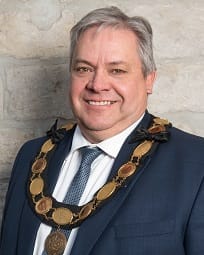WELLINGTON COUNTY – The provincial government’s announcement of a $1.2-billion fund to help municipalities support the creation of new housing may have been the biggest news to come out of the 2023 Association of Municipalities of Ontario (AMO) Conference.
But Warden Andy Lennox doesn’t think the cash injection will move the needle for Wellington County municipalities.

ANDY LENNOX
Dollars from the Building Faster Fund, announced at the Aug. 21-23 AMO conference in London, will flow to municipalities over a three-year period, beginning in 2024-25.
However the vast majority will be directed to Ontario’s largest and fastest growing municipalities and will be tied to performance against housing targets assigned by the province and committed to by municipalities earlier in 2023.
A portion (10 per cent) will also be available for smaller municipalities that do not have housing targets, the province announced.
“They did set a portion of it aside for what they call rural and northern municipalities. I don’t think it’s going to have a huge impact in terms of building the infrastructure that’s going to be required for growth,” Lennox told the Advertiser in an Aug. 24 telephone interview.
Lennox said other speakers at the conference had run the numbers, “and it’s only about one-fifth of the amount of money that they took away from municipalities through Bill 23 and the reduction in development charges.
“So even if everybody gets their fair share – which I’m not sure how that’s going to go, because they haven’t released any details – there’s still going to be a big hole for Wellington municipalities in terms of dollars to build the infrastructure like water, wastewater, roads, etc, to accommodate the growth,” Lennox explained.
An AMO press release issued following the conference noted Ontario municipalities own and manage almost $500 billion of infrastructure systems.
In 2021, municipalities invested nearly $12 billion in infrastructure assets. AMO estimates that additional funding of at least $1 billion annually will be needed to address the shortfall created by changes to the Development Charges Act.
“To meet the province’s target of building 1.5 million new homes by 2031, municipalities need to invest in infrastructure such as water and wastewater, roads, parks, emergency services and more,” stated AMO president Colin Best, who called the creation of the Building Faster Fund “an important step toward addressing the gap in municipal infrastructure funding created by Bill 23.”
Lennox said he came back from the conference feeling the government is focused on key issues for municipalities.
“There was lots of talk about housing and the need for housing, lots of talk about homelessness, addictions, mental health issues,” he said.
“I think everybody agrees that those are issues that are universal across the province that everybody’s grappling with. I think the province is tuned in on those issues, but I don’t know that we have arrived at where we’re going to start implementing solutions to some of those things.”
As part of the Western Ontario Warden’s Caucus (WOWC), Lennox participated in delegations with numerous government and opposition officials including Minister of Municipal Affairs and Housing Steve Clark, Solicitor General Michael Kerzner and Associate Minister of Mental Health and Addictions Michael Tibollo.
WOWC members also met separately with provincial NDP and Official Opposition leader Marit Stiles, interim Liberal leader John Fraser and Guelph MPP Mike Schreiner, leader of the Green Party of Ontario.
Lennox said topics discussed in the WOWC delegations included housing, homelessness and rural workforce issues.
“And if you think about it, all three are tied together,” Lennox noted.
“We don’t have the work force because we don’t have places for them to live. We have homelessness … because we don’t have adequate, affordable places for people to live. So they’re all three important topics for Western Ontario, Wellington included, but they do kind of all have some things in common,” he stated.
Lennox observed that homelessness is increasingly becoming an issue in rural areas of Wellington.
“It is affecting, directly affecting, our communities and becoming more visible than it has been in the rural context for as long as I can remember,” he stated.
While noting the problem is still “more visible” in Guelph, it also impacts the county, which administers social services for both municipal bodies.
“We don’t have enough resources to meet the demand that’s happening right now and it’s a demand that has been growing fairly dramatically,” the warden pointed out.
Lennox said the meetings he was involved in were “productive and thoughtful.
“I do think the government is under some pressure around some of the issues and hopefully, we can get more cooperation from the federal government too, particularly on things like the housing and infrastructure files.”



